Stop Awarding the Nobel Peace Prize to War Criminals
Since the release of The Dark Knight back in 2008, a certain phrase started circling around the internet where the character Harvey Dent said: “You either die a hero, or you live long enough to see yourself become the villain.” It has become one of the most popular pop culture phrases in the world where it is applied to public figures in different industries who usually start out doing great but turn rotten after some time in power. Couple that with a phrase from Captain America: The Winter Soldier when one of the Hydra agents said “Peace isn’t an achievement, it’s a responsibility,” and you have a thesis statement for the Nobel Peace Prize and its receivers.
The Nobel Prize is Among the most prestigious awards in the world. It has honored some of the most celebrated and revered international figures and organizations in history, but it has a very ominous origin story.
The Irony of the Founder
The dichotomy begins with the founder Alfred Nobel who was a weapons trafficker and the inventor of TNT. His nickname was ‘Dynamite King’. It's believed Nobel decided to create the prize after a French journalist accidentally published an obituary on him instead of his deceased brother entitled The Merchant of Death is Dead. Thanks to that unflattering epitaph, The Nobel Prize was founded and continues to be awarded annually to pioneers in the fields of World Peace, Chemistry, Physics, Physiology or Medicine, and Literature.
And, you guessed it, the most controversial prize has always been the Nobel Peace Prize, and for very valid reasons.
Alfred Nobel stated in his will that the Peace Prize shall be awarded to the person who in the preceding year "shall have done the most or the best work for fraternity between nations, for the abolition or reduction of standing armies and for the holding and promotion of peace congresses". He further specified that the prize shall be awarded by a committee of five people chosen by the Norwegian Parliament.
Cool, right? No, not exactly.
While the main goal of the Nobel peace prize is to recognize an individual organization or cause for their peace-building efforts, much of the controversy stems from the committee choosing aspirational icons who are always thirsty for power. Criticisms abound when these laureates go on to commit, defend or are generally associated with domestic or international atrocities.
From the 1970s forward, the award was increasingly given to promote versions of domestic political change always in line with the larger ambitions of the liberal international orders, and of course, some we have seen were not quite as committed to the Nobel Peace Prize committee's vision as they were thought to be.
The list of global public figures who exacerbated their political status around the world is surely long, but here are the ones who received the Nobel Peace Prize in the 20th and 21st century who now face endless criticism for their actions:
Barack Obama (2009)
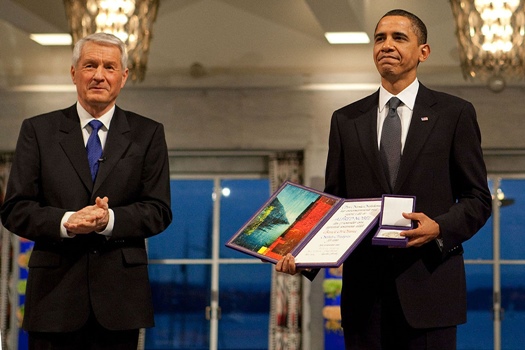 Photo Source: Wikimedia Commons
Photo Source: Wikimedia Commons
Perhaps the most prominent American President in the last 50 years, Barack Obama received the Prize only a few months after he was inaugurated as the US President for his “extraordinary efforts to strengthen international diplomacy and cooperation between peoples." Obama is heavily regarded as a war criminal who dropped bombs on several countries in the Middle East and enforcing more troops into Syria and Iraq, increased military operations in Afganistan and the use of drones and collateral damage, and led military intervention in Lybia. All of this happened while he was receiving the Nobel Peace Prize, yet the Committee turned a blind eye.
Obama said in a late-night interview in 2019 that he still doesn’t know why he was given this Prize. Same, Mr. President!
Aung San Suu Kyi (1991)
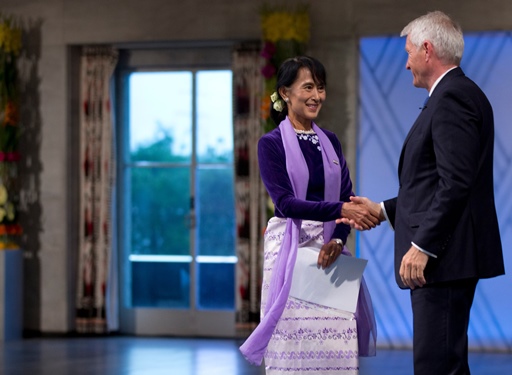 Photo Source: AP Photo
Photo Source: AP Photo
Aung San Suu Kyi held the office of Prime Minister of Myanmar, formerly known as Burma, from 2016 to 2021 (she was recently overthrown by a military coup). Before that, she was the General Secretary of the National League for Democracy from 1988 to 2011, the same party that organized the coup d’etat giving leeway for Suu Kyi into power.
During her tenure as the General Secretary, she received the Nobel Peace Prize for her “non-violent struggle for democracy and human rights." While that may be true at the time of her receiving the award, this has drastically changed under her rule as Prime Minister. Suu Kyi fell from grace internationally when she supported the military’s 2017 campaign of genocide against the Rohingya, a Muslim ethnic minority group. She not only refused to condemn the military for its actions but went as far as to defend them in an international court.
Henry Kissinger (1973)
Henry Kissinger was a political scientist and a diplomat and more importantly, he served as a national security adviser and eventually Secretary of State under the Republican administrations of presidents Richard Nixon and Gerald Ford. All of this was during the Vietnam War.
Kissinger and Lê Đức Thọ (a Vietnamese politician) received the Peace Prize for the 1973 Paris agreement that “intended to bring about a cease-fire in the Vietnam war and a withdrawal of the American forces."
But he was no short of a detrimental war criminal.
He worked to prolong the Vietnam War, advocating for it to continue as long as possible resulting in the countless deaths of Cambodians, Vietnamese, Americans, and others. In that region, he encouraged former President Richard Nixon to wiretap and politically intimidate his enemies in politics that was not popular across the country. He supported the secret bombing of Cambodia and Laos killing thousands of innocent civilians destabilizing Cambodia leading to a political regime that came into power and killed literally millions he also masterminded an illegal 1973 coup in Chile and other covert politically motivated military interventions in countries like Rhodesia East Timor and Argentina.
Muhammad Anwar el-Sadat & Menachem Begin (1978)
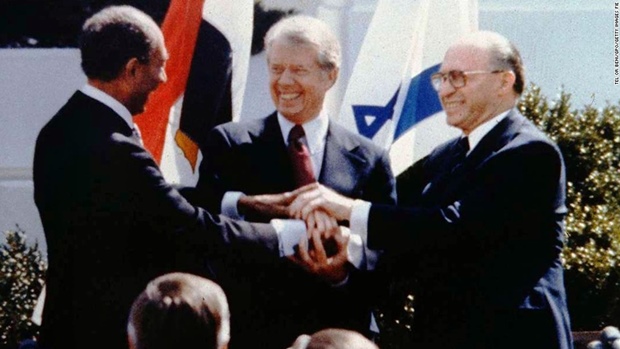 Photo Source: Getty Images
Photo Source: Getty Images
This is where I start diving into tumultuous territory: The Middle East.
After the 1973 War between a coalition of Arab states led by Egypt and Syria and Israel, where the latter decided that it had no chance to occupy the Egyptian and Syrian territories without arduous military power, the peace process had to begin, which led to The 1978 Camp David Accords that in turn led to the return of the Sinai to Egypt and normalized relations—the first peaceful recognition of Israel by an Arab country, which many consider a sham in the legacy of former Egyptian President Anwar El-Sadat.
Both leaders received the Nobel Peace Prize for the Camp David Agreement, which “brought about a negotiated peace between Egypt and Israel". El-Sadat was assassinated in 1981, while Begin was touted as a mass-murderer as he was the leader of the Zionist militant group Irgun that fought and killed the Palestinians during the 1948 War in Palestine (also known as El Nakba/The Catastrophe).
Yasser Arafat, Yitzhak Rabin, & Shimon Peres (1994)
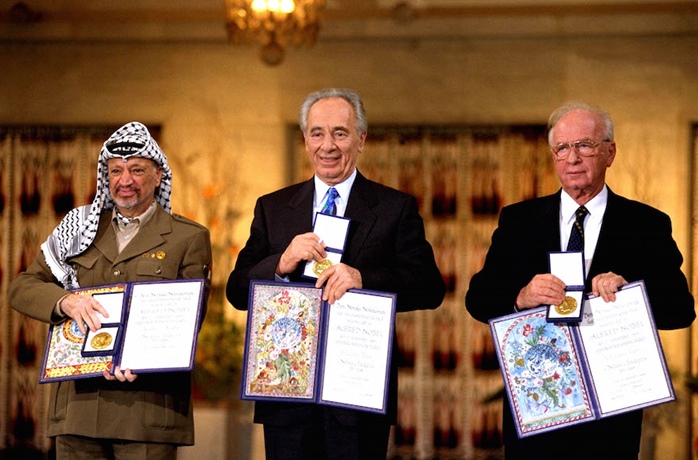 Photo Source: Getty Images
Photo Source: Getty Images
Arguably the most controversial Arab leader of the last century, Yasser Arafat was a figure to behold. Arafat was a hero of the Palestinian uprising against the Israeli occupation, and he's one of the founders of the political faction Fatah (active since 1959) and fought with the organization against Israel with the aim of liberating Palestine. He eventually signed the Oslo Accords with Israeli Prime Minister Yitzhak Rabine in September 1993 which created the promise of peace.
Almost 30 years later, there's still no resolution to the Israel-Palestine conflict and settlement expansion continues till today. The Oslo Accords were strongly opposed by a large portion of the Palestinian population; philosopher Edward Said famously described them as a "Palestinian Versailles". Arafat died in 2004 from what was reported to be a month-long illness.
The peace in the Middle East seems now like a long-term dream that Arafat had hoped to solve with a magic wand, only to see it more stateless in front of his dying eyes.
Abiy Ahmed (2019)
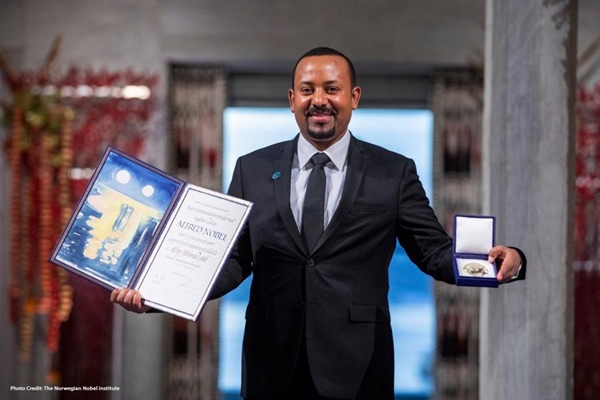 Photo Source: The Norwegian Nobel Institute
Photo Source: The Norwegian Nobel Institute
The last person on the list is the most recent winner who’s been murdering his own people. The Ethiopian Prime Minister, Abiy Ahmed, who received a Nobel Prize for ending one of Africa’s longest-running conflicts, in particular for his decisive initiative to resolve the border conflict with neighboring Eritrea, has been waging a war of his own making towards the end of 2020.
In early November of that year, Ahmed announced that he had ordered troops to respond to an allegedly deadly attack on a government military base in Ethiopia’s Tigray province. Leaders there say the Tigrayan people are being blamed for tensions that surfaced as Ahmed implemented reforms and postponed elections due to COVID-19. Many civilians were killed and displaced, and the political and military unrest in Central Africa has never been higher.
Reforming The Nobel Peace Prize
Since the winners of this award are usually under an international spotlight for the rest of their lives, naturally, they should not change their policies after winning. Aside from the winners of the prize who already had corrupt policies before taking it home, in the last 30 years or so, all the winners had a significant shift to power. This leads me to two solutions: Either a) the Nobel Peace Prize is publicly revoked after the winner is given the prize if they directly or indirectly commit morbid atrocities or b) the Nobel Peace Prize is only given to a person after they are no longer in a position of power and must ascertain that they won’t be a member of public office again or else the Prize will be revoked.
While neither of these conditions might take place soon, the Nobel Prize Committee is bound to make the same mistakes again and give recognition to individuals who might bring destruction with them in the future. While there are several Nobel Peace Prize winners who made the world a better place, there are still ones who bring grief, humiliation, and despair to families every day.
After the deadline for 2021's nominations at the beginning of February, Aleksei A. Navalny, the Russian dissident leader; Greta Thunberg, the teenage climate change activist; and the World Health Organization were among the nominees, Reuters reported. The BLM movement can also be a heavy contender, which won't be the first time a human rights movement won a Nobel Peace Prize, but will definitely the most impactful and most needed in this day and age.
And I, as always, will keep the optimism alive.
Post a comment